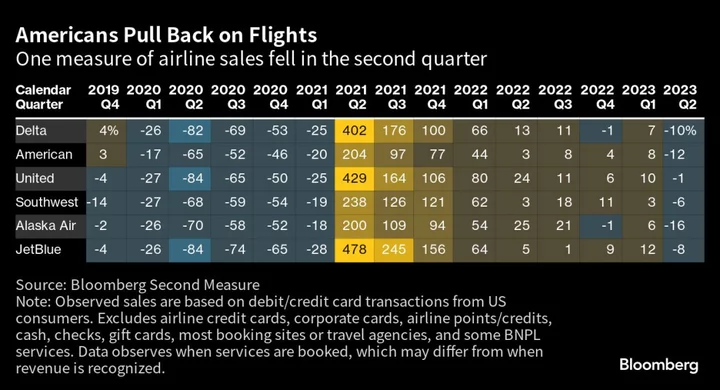The air travel boom in the US appears to be fading.
Purchases by US consumers directly from major domestic airlines declined across the board in the second quarter, marking the first drop in more than two years, according Bloomberg Second Measure. The data isn’t a full picture, though. It tracks anonymous credit and debit card transactions made with carriers, but excludes booking sites and corporate sales.
Americans splurged on air travel over the past year as pandemic restrictions lifted; not even a surge in ticket prices slowed them down. But after facing the highest inflation in decades, consumers have been reducing all kinds of discretionary purchases, including apparel, electronics and sit-down restaurants. Now it appears they’ve added flying to that list.
This softness has the potential to derail a rebound that has boosted results across the industry. Delta Air Lines Inc. and United Airlines Holdings Inc. recently raised their annual profit forecasts on continued strength in international bookings. And a record number of passengers are expected industrywide this summer.
But Alaska Air Group Inc., which is focused on the US and North America, said it’s bracing for a hit to this quarter’s results as it contends with declining prices and softening demand for domestic travel. Fares that were “really strong” through June have declined from record levels in 2022, but remain above 2019 prices, according to Alaska’s Chief Financial Officer Shane Tackett.
Read More: Frequent-Flyer Miles Are Hotter Than Cash This Summer
Southwest Airlines Co. posted second-quarter sales last week that topped Wall Street’s expectations, but worries about how well demand will hold up the rest of this year and the carrier’s plan to boost flying capacity hammered the stock. In July, the shares of the five largest US carriers have all declined, compared to about a 3% gain for the S&P 500. Investors will get more industry insights on Tuesday when JetBlue Airways Corp. reports.
One bullish case for the industry is that lower ticket prices will encourage more purchases. But transactions fell in the second quarter from the same period a year earlier for 8 of the 10 major US airlines tracked by Second Measure. The median decline was 5.3%, the biggest drop since the first quarter of 2021.
Typically, fliers buy tickets weeks and months in advance, so the summer boom has mostly been booked. Second Measure tracks when flights are purchased. That differs from airlines because they only record them as revenue when they are flown. For example, a ticket purchased in March for an August departure would be counted as revenue in the third quarter when the flight is made, not the first.
Until a flight happens, the companies consider it a short-term liability on their balance sheets. So-called air traffic liability is the value of flights that have been sold, but haven’t been flown.
So far five large carriers have reported their second quarters, and all but Southwest have experienced weaker growth in air traffic liability, or worse. American Airlines, the second-largest US carrier, posted its first decline in air traffic liability since the depths of the pandemic in 2020.
--With assistance from Mary Schlangenstein.









